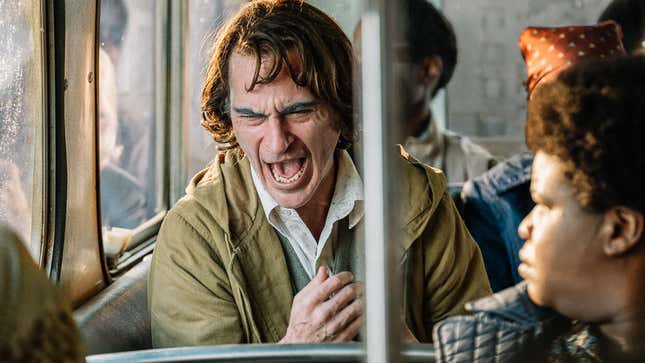
Ladies and gentlemen, introducing…*drumroll* the entitlement of white men!
*Uproarious applause*
The curtains rise and a spotlight glares on a self-loathing man who lives in his mother’s basement and feeds off the hypothetical nourishment of womanly desire (he would typically be referred to as an “involuntary celibate” or an “incel”). For reasons unbeknownst to him, he does not “win” said womanly desire and unleashes a melee onto society because he can’t bear the brunt of the word “no.”
Two words ultimately save him from the crowd, who basically represents judge and jury: mental illness.
Cue, Todd Phillips’ foray into DC Comics lore, Joker.
From the synopsis provided by the Toronto International Film Festival (TIFF):
Arthur Fleck (Joaquin Phoenix) ekes out a living as a clown, performing for tourists and children as he dreams of fame as a stand-up comedian like his hero, talk show host Murray Franklin (Robert De Niro). But people never do what Arthur wants them to do, his inner torment eats at him, and his ailing mother keeps harping on everything she is owed by her former employers, the Wayne family. Life is so ugly that you just have to laugh.
As Arthur descends into the unhinged killer he must become, Phoenix keeps us on edge as he reveals the soul of a man in crisis. A tentative romance with his neighbour Sophie (Zazie Beetz, also at the Festival in Lucy in the Sky and Seberg) grows more dangerous with each encounter.
“I always thought my life was a tragedy, now I know it’s a fucking comedy,” Arthur muses during what is likely his turning point—and a traumatic one at that.
The audience is also left dissecting what they’ve just witnessed as the film intentionally attempts to manipulate them from the vantage point of the unreliable narrator, Arthur. Arthur is bullied from every direction, whether it’s the group of asshole teens who take his advertising sign and pummel him in the alley or the black mother who berates him (a strange white man on the bus) for talking to her toddler son. One of these things is not like the other, yet they both play as catalysts (or worse, defenses) for his ultimate demise.
It is a demise that, per usual for men like Arthur, is explained away by mental health. And yet, unless you are prone to idealize or sympathize with mass murderers like Arthur, it’s difficult not to peep the bullshit.
From the National Council For Behavioral Health’s August 2019 report titled, Mass Violence in America: Causes, Impacts and Solutions:
The American Psychiatric Association’s Diagnostic and Statistical Manual of Mental Disorders, Fifth Edition (DMS-5), provides a catalog of diverse brain-related health conditions that impair a person’s normal ability to reason and perceive reality, regulate mood, formulate and carry out plans and decisions, adapt to stress, behave and relate to others in socially appropriate ways, experience empathy, modulate consumption and refrain from intentional self-injury — or various combinations of such problems. While a subset of people perpetrating mass violence has one of the more severe mental illnesses or personality disorders, many do not. Lumping all mental illness together, and then assuming that acts that seem incomprehensible to the average person are due to mental illness, results in millions of harmless, nonviolent individuals recovering from treatable mental health conditions being subjected to stigma, rejection, discrimination and even unwarranted legal restrictions and social control.
We’ve all heard the adage, “hurt people hurt people,” right? Well, Arthur is a man so imprisoned in his delusion, using the word “hurt” for what he projects onto others is quite the understatement. And yet, the very “mental illness” that potentially absolves people that look like Arthur is used to exploit those who don’t.
Arthur has had an extremely fucked up life, indeed, but he’s also entitled. He’s entitled to acceptance, laughs and the quirky hot neighbor with the sly smile (Beetz). Hell, he’s even entitled to the benefit of the doubt. Sure, the socio-political subtext of the film introduces a (valid) war against capitalism, but is Arthur a man of the people or is he a self-serving miscreant who staunchly believes the world owes him everything?
Following the first official trailer debut earlier this year, there was a bit of concern that the film may incite violence or imitators (similar to the glorification of infamous serial killers). Sure, there are deranged men who may see this film and exclaim, “I feel seen!” but it will only be a reflection of what already exists, not the inception of it. In this case, art is most certainly imitating life.
“This film is fucking bonkers,” Phillips exclaimed before the lights simmered down so the audience could dig into two hours of just that. As the excited director noted, Joker is a slow burn, but once that fire reaches its peak? Boy does it fucking ever.
Once the fire is set ablaze, the audience will erupt into a cacophony of “Oh shit… OH, OH SHIT!” moments inspired by the film’s insane crescendo. Ultimately, it’s entertaining and polarizing—there are people who will view the newly born Joker as a hero and others who will see him for the deranged white man he is. And I believe this was intentionally orchestrated to have that very effect.
If there was ever a sizzle reel strictly dedicated to Phoenix’s method acting, every single frame he entered in Joker would make the cut. From the very first time you see Arthur’s crumbled yet wry face to his unraveling (or blossoming, depending on the way you look at it), this film is Phoenix’s showcase. And you’ll never get that fucking laugh out of your head.
Joker laughs its way into theaters Oct. 4.

